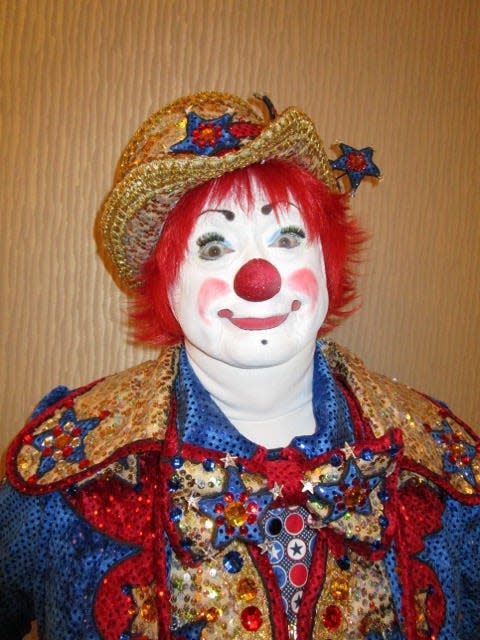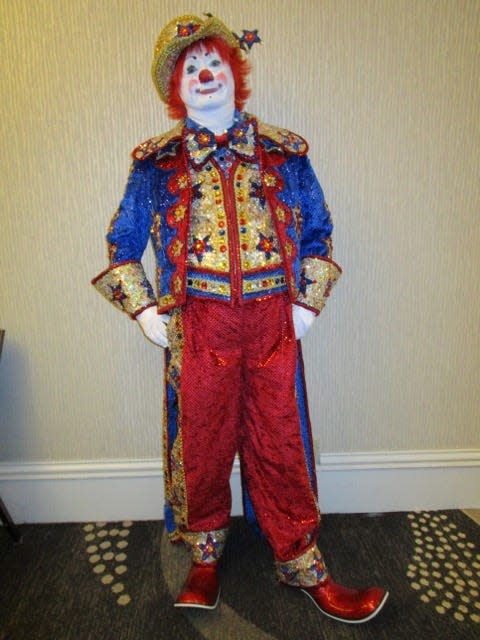Beloved Newark physician now provides patient relief through clowning

Nicholas Reed was still a student at Toby’s Clown School when he walked into a local hospital in full clownget-up to bring some smiles to the patients.
He had already finished his shift and was on his way out when a couple stopped him in the hallway.
“We’d really like you to go see my father in Room Such-and-Such,” Reed recalls the man saying. “He’s pretty sick, and I think if you saw him, it’d cheer him up.”
Reed had spent enough time in hospitals during his 35-year career in obstetrics and gynecology to know that an intensive care unit isn’t necessarily the best place for a clown, so when he realized that was where the room was located, he paused to reconsider.
But with a nurse’s blessing, he continued.
“I went to the room and I knocked on the door, and I stuck my foot into the room first — great big clown shoes, size 19 — and looked around the corner,” Reed said.
Inside he met an elderly man hooked up to oxygen. His daughter, who looked at Reed with a gratitude he will never forget, sat at the foot of his bed. A smile came over the man’s face, and after their brief visit, Reed told the man he’d be back but would be unrecognizable in street clothes.
When Reed returned a couple days later, however, the man was gone.
Thinking the worst, Reed inquired about the man’s condition and was relieved to hear he had been discharged.
“I don't know that I had anything to do with him getting well,” Reed said. “(But) I think sometimes I was treating myself as much as I was treating the patient. It was a positive feedback situation that reinforced what I was going to do.”
Clowning has been a second career for Reed, 81, a Celina native and longtime Licking County physician, since 2008. He doesn’t do it for the royalties (there are none); he deals in the currency of laughter and smiles, and in that regard, he is well off.
“It has nothing to do with money, nothing to do with fancy costumes. It has to come from the heart,” said his wife, Nancy Reed, who supports her husband’s hobby to the extent of approving a climate-controlled, 20-by-30-foot “Clown Cottage” recently erected in the couple’s backyard that contains thousands of dollars’ worth of clowning paraphernalia. “He is just really great at being spontaneously funny.”
After graduating from high school, Reed attended Miami University for his undergraduate degree, followed by medical school at Ohio State University, from which he graduated in 1970 following an internship at Mount Carmel and four-year residency.
He spent two years in the United States Air Force before settling in Licking County. In his time as a doctor, he estimates he delivered at least 12,000 babies, performed approximately 10,000 surgeries and attended to “at least half a million women.” He found the profession to be incredibly rewarding and was particularly drawn to the precision of the surgery aspect, he said.
“When I was in Newark for those 35 years, basically, just before I left, I could not go hardly anywhere without somebody recognizing me. They'd say, ‘Oh, you see that old white haired guy over there? He delivered you!’ — that sort of thing,” he said, reminiscing about the fellow doctors, nurses and patients that he misses from those days. “I think a lot of times when I became a clown and went into hospitals, nursing homes, or just ordinary clowning around, I think sometimes I was entertaining myself just as much as I was entertaining them.”
And while countless quips undoubtedly exist to connect his long-time career with his post-retirement passion, Reed always did recognize the role of tactful humor in a doctor-patient relationship.
“When you're a patient and you come in — I don't think anybody ever really wants to come in, even if it's just for an annual exam,” Reed said, citing the many worries that could cause a patient to be uneasy at a gynecological exam. “So my ‘humor therapy’ helped put them more at ease. I tried to do it in an appropriate manner. That’s one way I could say that laughter is good medicine.”
Following retirement, the Reeds chose to settle in the community of Lake Placid, Florida, so he could fish. They wanted a small town — quiet, with little traffic. And it just so happened to be the home of the American Clown Museum and its accompanying clown school.
“When we got here, accidentally — coincidentally — there was a clown school. And he said, ‘Well, I'm going to take that class,’” Nancy recalled. “And so he took it, and they taught him how to put makeup on, how to find costumes. And he never had time to do anything like that before.”
His clown name, fittingly, is “Doc.”

Reed has come a long way as a clown since those early clown school days, earning accolades at multiple clowning competitions across the United States. He especially prides himself on the attention to detail that makes his makeup, costumes and props stand out — a precision that he picked up as a doctor. Most recently, Reed was chosen as the Clowns of America International (COAI) Clown of the Year, earning himself a spot on the cover of the organization’s bimonthly magazine, ‘The New Calliope.’
In his introductory letter of the January/February issue, COAI president Adam Schill reflected on past interactions with Reed that culminated in the 2019 Las Vegas COAI convention, where Reed was rolled out on a stretcher after having been struck with sudden hearing loss due to a rare autoimmune condition called Meniere’s Disease.
“I ran up to Doc’s room before the paramedics got there. As he was headed down the hallway on the gurney, he shouted out, ‘How’s this for paradeability?!’” Schill wrote, referring to a competition category that judges how well a clown entertains during parades. “All the tension and anxiety seemed to fade away. It’s this attitude and the ability to bring light to nearly any situation that cements Doc’s place as a clown and asset to COAI.”
The Meniere’s Disease diagnosis forever changed clowning for Reed. With two cochlear implants, he struggles to hear about half of what is said to him, even within close range. Loud or busy places can be overwhelming, and for that reason, Reed’s ability to travel has been severely limited.
Faithfully by his side, Nancy serves as her husband’s translator, relaying words and phrases so that he can understand and respond.
But Reed isn’t done with clowning — not by a long shot. He continues to help out at the school and participate in local parades and festivals, hoping to rejoin the competition circuit some day.
“It’s been very hard, but I’m still trying to continue as best I can,” he said.
For her part, Nancy has been nothing but supportive, encouraging her husband in his passion of bringing laughter to the world.
“I think it's brought him a lot of happiness. I think he brought a lot of happiness to a lot of people. I think many times he has more fun than anybody else in the room,” she said. “He entertains himself first and then everybody is very happy.”
This article originally appeared on Newark Advocate: Beloved Newark physician now provides patient relief through clowning

